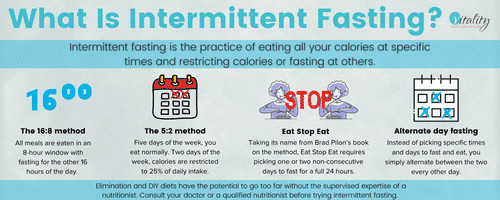Taking care of your body is an investment in your future and a commitment to increasing your quality of life. Too many people spend their lives normalizing symptoms, aches, and pains that can be medically addressed, but it’s never too late to start making healthier choices for yourself.
The New Year is filled with resolutions to get in better shape, eat healthier, and schedule overdue visits to the doctor. It’s also filled with advertisements, health bloggers, celebrity endorsements for fad diets, and controversial weight loss methods. In recent years, intermittent fasting has grown in popularity as the answer to the fad diet controversy, but is that an honest description of the practice?
What Is Intermittent Fasting?
Intermittent fasting is the practice of eating during specific times and fasting during other times. There are a few types of intermittent fasting methods. The most popular methods include:
- The 16:8 method – The premise of this method is simple. Eating and drinking caloric beverages is restricted to 8 hours every day. You can pick any 8 hour period that works for your lifestyle. During the other 16 hours, you are expected to fast and restrict your beverage intake to water and other no-calorie beverages.
- The 5:2 method – This method is equally straightforward but applies to days, during the rest of the week not hours. Five days a week, your life is as it always was, but two days a week, you restrict your calories to 25% of your daily intake.
- Eat Stop Eat – Taking its name from Brad Pilon’s book on the method, Eat Stop Eat requires picking one or two non-consecutive days to fast for a full 24 hours. It’s recommended that you don’t restrict your calories during the rest of the week, but you should consider eating a well-balanced diet.
- Alternate day fasting – This method is arguably the most straightforward of the popular intermittent fasting methods. Instead of picking specific times and days to fast and eat, you simply alternate between the two every other day.
Evidence-Based Benefits Of Intermittent Fasting
Fasting Promotes Immediate Chemical Changes In The Body.
When you fast, your insulin levels drop, and human growth hormone levels grow, making it easier to burn fat. During fasting, your body begins a necessary cellular repair process that rids your cells of unnecessary waste.
Fasting Helps You Lose Weight And Target Belly Fat.
For the same reasons, the aforementioned reduction in insulin and an increase in human growth hormone, fasting can help you lose weight and target belly fat. Studies have shown that individuals who have followed a consistent intermittent fasting pattern are as likely to lose weight as those who restrict calories every day.
Will Intermittent Fasting Help Me Lose Weight?
The answer to this question is convoluted. If you would like to lose weight, it’s important to do so in a healthy manner. Elimination and DIY diets have the potential to go too far without the supervised expertise of a nutritionist. Certain conditions may benefit from intermittent fasting, but you must consult your doctor before you attempt any restrictions on your own.
For more information about healthy weight loss and general wellness, contact our team today!





